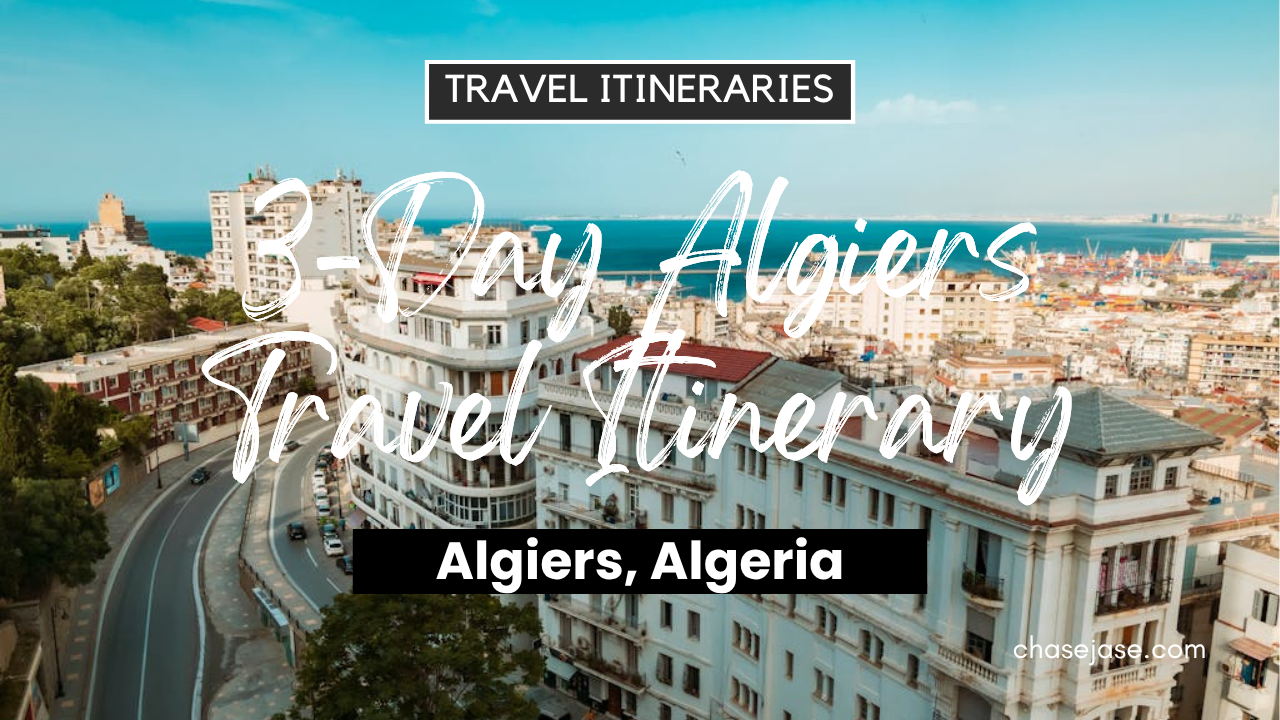3-Day Algiers, Algeria Travel Itinerary

Introduction:
Algiers, the capital city of Algeria, is a captivating blend of Mediterranean charm, French colonial architecture, and Islamic heritage. Nestled along the azure coastline of the Mediterranean Sea, Algiers is often called “Algiers the White” due to its whitewashed buildings that cascade down the hillsides. This vibrant North African city is a treasure trove of history, culture, and modern urban energy. With its winding Casbah alleyways, Ottoman palaces, contemporary museums, and panoramic seaside views, Algiers offers a unique travel experience that bridges Europe, the Middle East, and Africa. A 3-day trip to this city is just enough to uncover its layers of intrigue and beauty.
Places to Visit:
- Casbah of Algiers: This UNESCO World Heritage site is a maze of narrow streets, hidden courtyards, Ottoman palaces, and centuries-old mosques. It is the historic heart of the city.
- Martyrs’ Memorial (Maqam Echahid): A towering concrete monument commemorating Algeria’s struggle for independence. It offers breathtaking views of the city and the sea.
- Basilique Notre Dame d’Afrique: A 19th-century Catholic basilica perched on a cliff, known for its stunning architecture and scenic views of the Mediterranean coastline.
- Bardo National Museum of Prehistory and Ethnography: Located in an 18th-century palace, this museum houses artifacts that showcase Algeria’s rich prehistoric past and diverse cultures.
- Palais des Rais (Bastion 23): A group of restored palaces showcasing Ottoman-era architecture, with exhibitions and artistic installations.
- Le Jardin d’Essai du Hamma (Botanical Garden): A sprawling 32-hectare garden established in 1832, featuring a variety of exotic plant species and a peaceful atmosphere.
- Ketchaoua Mosque: A historic mosque located at the foot of the Casbah, known for its blend of Moorish and Byzantine architecture.
- Algiers Central Post Office (La Grande Poste d’Alger): A masterpiece of Moorish Revival architecture and one of the city’s most iconic landmarks.
- Le Musee National des Beaux-Arts: The National Museum of Fine Arts houses the largest collection of fine arts in Africa, featuring Algerian and European works.
- El Madania Cable Car: A scenic cable car ride that connects various parts of the city and offers panoramic views of Algiers from above.

Sample Itinerary:
Day 1: Historical Core and Cultural Immersion
- 9:00 AM – Casbah of Algiers Exploration (2.5 hours): Start your day walking through the ancient Casbah. Explore its narrow alleys, admire Ottoman-era homes, and visit the Ketchaoua Mosque. Wear comfortable shoes, as the terrain is steep and cobblestoned.
- 12:00 PM – Lunch at a traditional Algerian restaurant (1 hour): Try dishes like couscous, chorba (spiced soup), or mahjouba (stuffed flatbread).
- 1:30 PM – Visit Palais des Rais (1.5 hours): Discover the restored palaces of Bastion 23 and enjoy the art exhibitions while observing intricate Islamic and Ottoman architecture.
- 3:30 PM – Martyrs’ Memorial (1 hour): Take a taxi or cable car to the Martyrs’ Memorial. Stroll around the monument, then visit the Museum of the Mujahideen located underneath.
- 5:00 PM – Walk along the seafront promenade (1 hour): Head to the port area and enjoy the Mediterranean breeze along the boulevard.
Day 2: Museums, Gardens, and Spiritual Landmarks
- 9:00 AM – Bardo National Museum (1.5 hours): Explore the museum’s prehistoric artifacts and learn about Algeria’s ancient cultures.
- 11:00 AM – Basilique Notre Dame d’Afrique (1 hour): Drive to the basilica on the hill. Appreciate the fusion of architectural styles and panoramic views.
- 12:30 PM – Lunch with a sea view (1 hour): Dine at a cliffside café near the basilica with views overlooking the bay.
- 2:00 PM – Le Jardin d’Essai du Hamma (2 hours): Relax in this historical botanical garden. Stroll through palm-lined paths and ornamental ponds.
- 4:30 PM – El Madania Cable Car Ride (30 minutes): Catch a scenic ride and admire aerial views of Algiers’ hills and coastline.

Day 3: Art, Architecture, and Urban Discovery
- 9:00 AM – Grande Poste and surrounding area (1.5 hours): Visit the iconic post office and take time to photograph its ornate façade. Explore nearby streets for local boutiques and bookstores.
- 11:00 AM – Le Musée National des Beaux-Arts (1.5 hours): View a rich collection of artwork, including works by Delacroix and modern Algerian artists.
- 1:00 PM – Lunch at a modern Algerian bistro (1 hour): Sample grilled meats and mint tea in a relaxed, artsy setting.
- 2:30 PM – Explore downtown or shop for souvenirs (2 hours): Browse souks and shops for handmade ceramics, carpets, and spices.
- 5:00 PM – Sunset walk at the Port of Algiers (1 hour): End your trip with a final stroll along the harbor, watching the sun dip into the Mediterranean.
See Itinerary Map (Includes Places to Visit and Accommodations)
Best Time To Go:
Spring (March to May): This is the ideal season to visit Algiers. The weather is mild and sunny, averaging between 15°C and 22°C, making outdoor exploration comfortable. Gardens and hillsides are lush and in bloom.
Autumn (September to November): Another pleasant time to visit. Temperatures are moderate, and tourist crowds are fewer. It’s perfect for sightseeing without the peak summer heat.
Avoid the height of summer (July and August), as it can be hot and humid, with temperatures rising above 30°C.
Activities To Do:
- Wander the Casbah: Exploring its narrow lanes and ancient houses reveals the living history of Algiers. The Casbah is not just architecture—it’s a living neighborhood steeped in culture.
- Take a Cable Car Ride: The El Madania cable car offers not just convenience but stunning views. It’s a fun way to see Algiers from a unique angle.
- Savor Algerian Cuisine: Enjoy local delicacies such as mechoui (roast lamb), makroud (date pastries), and mint tea. Food here reflects Berber, Arab, and French influences.
- Visit Museums and Palaces: Each museum and palace showcases a different period in Algerian history, from prehistoric tools to Ottoman glory.
- Enjoy the Seaside: Algiers is a coastal city. Whether you’re taking a stroll on the Corniche or enjoying seafood at a marina restaurant, the Mediterranean is always present.

Accommodations:
- Sofitel Algiers Hamma Garden: A luxury 5-star hotel near the botanical garden, offering plush rooms and fine dining.

- Hotel El Aurassi: A large upscale hotel with panoramic views of the city and bay, located on a central hilltop.

- ABC Hotel Algiers: Located downtown, this hotel offers good service, clean rooms, and modern amenities.

- City Hotel Alger: A comfortable 3-star option in central Algiers with proximity to shops and transport.

- Hotel Samir: A simple hotel in the heart of the city, offering clean rooms and affordable rates.

- Dar El Ikram: A budget hotel with a traditional touch, located close to the Grande Poste.

- Hotel des Beaux-Arts: A great choice for solo travelers or backpackers, offering a friendly atmosphere.

Transportation Options:
- Metro: Algiers has a modern metro system that connects central districts like Tafourah, Hamma, and Hai El Badr.
- Cable Cars: The city operates several cable car lines that link hilltop districts and offer scenic rides.
- Taxis: Taxis are readily available but not metered. Agree on the fare in advance.
- Buses: Public buses are cheap and frequent, but can be crowded. Best for short, local trips.
- Car Rentals: Available at the airport or in the city. Best for regional exploration outside Algiers.
- Walking: Many key attractions are within walking distance in central Algiers, especially around the Casbah and the city center.
Tips:
- Dress Modestly: Algiers is a conservative city. Respect local norms by wearing modest clothing, especially in religious sites.
- Learn a Few French or Arabic Phrases: French is widely spoken and useful for communication.
- Be Cautious with Photography: Avoid taking photos of government buildings or police checkpoints.
- Use Bottled Water: Although generally safe, it’s best to drink bottled water to avoid stomach issues.
- Cash Is Preferred: While larger hotels accept credit cards, many smaller shops and restaurants prefer cash.
Algiers is a city that defies expectations. Its Mediterranean coastline, layered history, vibrant culture, and welcoming people make it a truly unique destination in North Africa. Over three days, visitors can experience its historic Casbah, majestic palaces, beautiful gardens, and bustling modern streets. Whether you’re drawn to its Ottoman architecture, colonial landmarks, or the simple pleasure of mint tea at sunset, Algiers, Algeria leaves a lasting impression. For travelers looking to explore a lesser-known gem with a rich soul, Algiers is a perfect choice.



